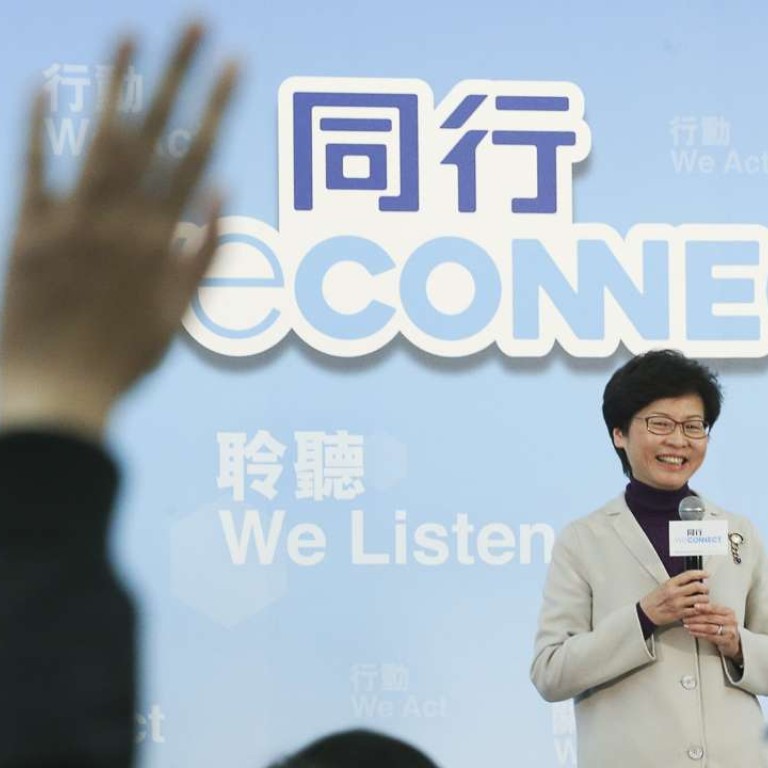
Carrie Lam skirts contentious issues with ‘half manifesto for the middle class’
Depoliticised offering was in stark contrast to key rival John Tsang Chun-wah, who tackled the big questions in his 73-page manifesto
If anyone was looking for answers to contentious political issues from Carrie Lam Cheng Yuet-ngor, she refused to take the bait. Instead, the leading chief executive contender deflected politics and focused on bread-and-butter issues at her much-awaited press conference yesterday.
She credited this to feedback received from the 30 or so nominating subsectors. And instead of unveiling a full platform, she offered ideas on housing, education and taxation – with the middle-class very much on her agenda.
Her depoliticised half manifesto was in stark contrast to key rival John Tsang Chun-wah, who grasped by the nettle the big questions in his 73-page manifesto.
He tackled upfront the implementation of “one country, two systems”, the city’s stalled political reform and the local legislation of a controversial national security law – all viewed as calculated moves to win over the pro-democracy and pro- Beijing blocs respectively.
In her plans, Lam offered to “rebuild the ladder for home buying” by introducing a new layer of affordable housing targeted at middle-class and first-time buyers.
Admitting current housing prices were beyond the reach of many buyers, she promised to look into creating more land for housing through reclamation, urban redevelopment or even developing the periphery of country parks – an idea strongly condemned by environmentalists. Tsang had vowed not to touch country parks.
“When government talks about reclamation, they say no. When government talks about urban renewal, they say no. When it’s just about slightly touching the country parks, they say no,” she said, adding such a mentality would only halt the city’s development.
Lam’s answer: a layer between the Home Ownership Scheme and private housing so the sandwiched class whose incomes were too high for public flats could be property owners too.
Those flats, reserved for permanent residents, would be modest 450 sq ft homes, she said.
She pledged to boost the supply of the Green Form Subsidised Home Ownership Pilot Scheme, which allows public housing tenants to buy subsidised flats at a 40 per cent discount rate compared with market prices. That would free more public rental flats for the needy, Lam added.
On the city’s economy, she proposed two new tax measures to relieve the burden on the city’s small and medium-sized enterprises and boost investment in research and development.
A two-tier tax regime would result in a 10 to 16.5 per cent reduction for firms with an annual profit of less than HK$2 million.
She also proposed “super deductions” for investments in innovation and technology, research and development, environmental protection measures, arts and culture and design.
Lam cited the city’s low expenditure in research and development industries – less than 1 per cent annually over the past decade, compared with 4 per cent in South Korea, 3.5 per cent in Japan and 2 per cent on the mainland.
Tsang, the former financial secretary, had earlier floated a two-tier profits tax proposal but with fewer details. He also vowed to look into a negative income tax to help low-income groups.
Lam said her understanding of tax policies was “less is more”, and abolishing estate duty or reducing wine taxes had brought benefits.
“It’s not simply about the direct ins and outs,” she said.
Chau Kwong-wing, chair professor of real estate and construction at University of Hong Kong, was sceptical of Lam’s idea about a new layer of subsidised housing for young professionals, calling it a populist move to pacify a very discontented group.
He warned it could disincentivise them from aspiring to the private market. “It has a lock-in effect where people continue to occupy the flats after their income level goes on to exceed the limit.”
On tax proposals, Lam’s ideas would benefit not only SMEs but also big businesses as the first HK$2 million profits would attract the lower 10 per cent rate, noted Marcellus Wong Yui-keung, senior tax adviser at PricewaterhouseCoopers Hong Kong and a member of the government’s working group on long-term fiscal planning.
Pressed on why she had made no mention of political reform in her first policy announcement, Lam pledged to include the issues in her final platform to be announced in early March.
“Political development and democracy are important topics ... but as I met electors, most of them are concerned about their sectors, housing and young people,” she said. “The election is not only about the one issue of political reforms.”
While chief rival Tsang said he was too busy to read Lam’s policy proposals, another chief executive contender Woo Kwok-hing described it as “extremely unfair and irresponsible” of her to not offer a full manifesto before the nomination period began.
He urged her not to dodge the issue of political reform as what she announced was “definitely not a satisfactory platform”.


